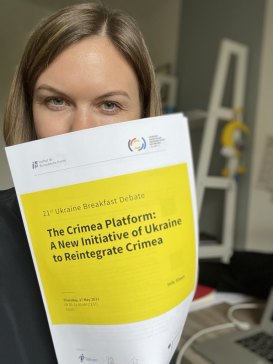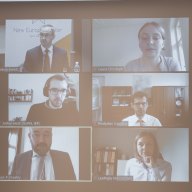21st Ukraine Breakfast Debate: „The Crimea Platform: A new initiative to reintegrate Crimea“

The 21st Ukraine Breakfast Debate on 27 May 2021 focused on the opportunities and potentials of the Crimea Platform. Around thirty experts from Ukraine and Germany took part in the online event.
The Crimea Platform was launched in 2020 at the initiative of President Volodymyr Zelensky. As an international forum, it is intended to facilitate exchange between Ukraine and its partners on the situation in Crimea and to develop joint positions. It is embedded in a strategy of the National Security and Defence Council (RNBO) to end the occupation of Crimea by political means and reintegrate the peninsula. Ljudmyla Melnyk, Project Manager of GURN 2 at the IEP Berlin opened the event. Afterwards, the three speakers presented their perspectives on the Crimea platform. They were Wilfried Jilge, expert at the Berlin Center for International Peace Operations (ZIF), Oleksiy Melnyk, Co-Director of the think tank Razumkov Centre in Kyiv and Dr Susan Stewart, Head of the Research Department on Eastern Europe and Eurasia at the German Institute for International and Security Affairs (SWP).
The participants agreed that the Crimea Platform was an initiative worth supporting. However, there were different arguments regarding its concrete form. Several aspects have to be taken into account: On the one hand, the Russian occupation of Crimea should be seen in the larger context of the militarisation of the Black Sea region. This has consequences for the security of Ukraine and international navigation, not only in the Kerch Strait and the Sea of Azov, but also for Ukrainian port cities in the northwest of the Black Sea. In the view of some observers, the Crimea Platform could contribute to international monitoring of the situation in the region.
The initiative envisages meetings at the highest diplomatic level and key officials would be involved in its implementation. Given the multiple domestic challenges Ukraine is currently facing, in particular a profound reform agenda, the question of available resources and Ukraine’s capacity to successfully advance both the reforms and the initiative was also raised.
At the request of the breakfast debate’s participants, the water supply to Crimea from the mainland and its significance for future disputes and possible negotiations between Ukraine and Russia were also discussed. In addition to Germany’s potential role in the Crimea Platform, the reactions of international partner countries so far were debated. Among other things, this involved the role of Turkey, which has already confirmed its support for the Platform, but on the other hand must consider Russia’s interests concerning Syria. The question of adding an economic dimension to the goals was also raised. One participant remarked that the discussions on a possible reintegration should not only be about the territory, but above all about the people living there. During the discussion, it was also highlighted that Ukrainian civil society already has a strong expertise on Crimea and should definitely be involved in the Platform’s work.
Analysis to listen to: Learn more about the Crimea Platform in the new episode of our podcast UkraineMEMO. On this page you can find more information and stream or download the podcast via your preferred platform. We hope you will enjoy listening!
The Ukraine Breakfast Debates are part of the project “German-Ukrainian Researchers Network” (GURN 2). The aim of the project is to strengthen cooperation between German and Ukrainian think tanks as well as expertise in the field of policy analysis and to promote bilateral dialogue and knowledge transfer. GURN 2 is implemented in close cooperation with the Ilko Kucheriv Democratic Initiatives Foundation (DIF, Kyiv), think twice UA (Kyiv) and the New Europe Center (NEC, Kyiv). It is kindly supported by the German Federal Foreign Office.




